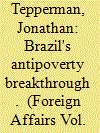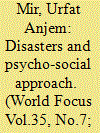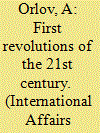|
|
|
Sort Order |
|
|
|
Items / Page
|
|
|
|
|
|
|
| Srl | Item |
| 1 |
ID:
142694


|
|
|
|
|
| Summary/Abstract |
In recent years, as public anxiety over growing inequality has intensified, policymakers and academics have started scrambling for some increasingly extreme solutions. India, for example, has launched massive programs to provide the poor with food and jobs, and the French economist Thomas Piketty has famously proposed a redistributive global wealth tax .
|
|
|
|
|
|
|
|
|
|
|
|
|
|
|
|
| 2 |
ID:
132499


|
|
|
|
|
| Publication |
2014.
|
| Summary/Abstract |
Disasters both manmade as well as natural often result in great physical and material loss for the affected communities, besides affecting the social, physical and psychological well-being of the survivors in its aftermath. It has been seen that disasters have an adverse impact on the survival, dignity and livelihoods of individuals and communities, particularly of the poor, in both developed and less developed countries. There are multiple factors which have been attributed as causes of these extreme events, like environmentally unsound practices, global climatic changes, population growth, urbanization, social injustice, poverty etc. However, when it comes to comprehension of disasters in contemporary times, there is a need to look at disaster as social phenomena. This is precisely, with regard to man- nature relationship discourse. While explaining this relationship, Kroeber (1939 p1), rightly writes, ' while it is true that cultures are rooted in nature, and can therefore never be understood except with reference to that piece of nature in which they occur, they are no more produced by that nature thana plant" is produced or caused by the soil in which it is rooted. The immediate causes of cultural phenomena are other cultural phenomena.
|
|
|
|
|
|
|
|
|
|
|
|
|
|
|
|
| 3 |
ID:
107096


|
|
|
|
|
| Publication |
2011.
|
| Summary/Abstract |
THE PROTEST WAVE that started in Tunisia in January has spread to a significant part of the Middle East and North Africa. To some degree or other, it has affected about 10 states with ruling regimes collapsing in two countries (as of press time) and with three being in an exclusively difficult situation, fraught with collapse. When, not so long ago, mankind was joyfully seeing in the New Year, 2011, no one even had an inkling of an imminent large-scale upheaval in the Arab world. So the legitimate question is: What happened next and how should the ongoing developments in this volatile part of the world be defined?
|
|
|
|
|
|
|
|
|
|
|
|
|
|
|
|
| 4 |
ID:
092123


|
|
|
|
|
| Publication |
2009.
|
| Summary/Abstract |
Violence is one of the most important causes of suffering and death on the planet. The incidence of different forms of violence varies markedly within and between populations with high rates of violence driven largely by poverty and social injustice and sustained by inept policy responses rooted in legal and moral frameworks. Violence therefore poses a major challenge for public health which is the discipline concerned with assuring the conditions for a healthy society. Over the past five decades it has become increasingly clear that public health has important contributions to make to the challenge of understanding and preventing violence, contributions which extend and complement conventional legal and moral approaches to violence. This work was led initially by the US Centre for Disease Control (CDC) and more recently by the World Health Organisation (WHO) which in 2002 published the first World Report on Violence and Health. Public health is a relatively atheoretical discipline. While a number of useful theoretical frameworks have emerged to better understand and prevent violence, there is no agreed or dominant public health theory of violence. James Gilligan has proposed a detailed and potentially useful public health theory of violence based on the notion that shame/humiliation, which violates an individual's self-respect and dignity, is the pathogen that causes violence; a pathogen intimately linked with cruelty and neglect in childhood, spread by the vector of inequalities in power, wealth and status in society and sustained by punishment and humiliation within the criminal justice system. This notion of violence resonates with Vittorio Bufacchi's concept of violence as a violation of integrity.
|
|
|
|
|
|
|
|
|
|
|
|
|
|
|
|
|
|
|
|
|